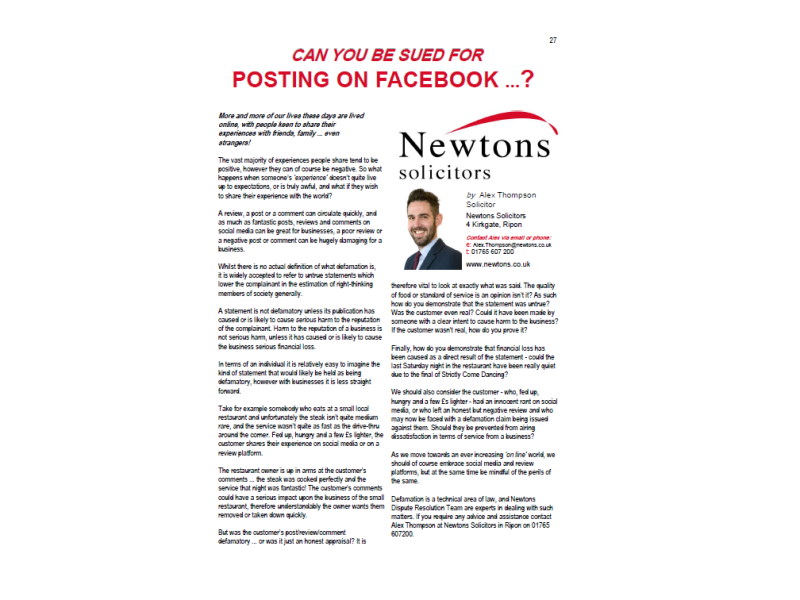More and more of our lives these days are lived online, with people keen to share their experiences with friends, family, even strangers!
The vast majority of experiences people share tend to be positive, however they can of course be negative. So what happens when someone’s ‘experience’ doesn’t quite live up to expectations, or is truly awful, and what if they wish to share their experience with the world.
A review, a post or a comment can circulate quickly, and as much as fantastic posts, reviews and comments on social media can be great for businesses, a poor review or a negative post or comment can be hugely damaging for a business.
Whilst there is no actual definition of what defamation is, it is widely accepted to refer to untrue statements which lower the complainant in the estimation of right-thinking members of society generally.
A statement is not defamatory unless its publication has caused or is likely to cause serious harm to the reputation of the complainant. Harm to the reputation of a business is not serious harm, unless it has caused or is likely to cause the business serious financial loss.
In terms of an individual it is relatively easy to imagine the kind of statement that would likely be held as being defamatory, however with businesses it is less straight forward.
Take for example somebody who eats at a small local restaurant and unfortunately the steak isn’t quite medium rare, and the service wasn’t quite as fast as the drive-thru around the corner. Fed up, hungry and a few £’s lighter the customer shares their experience on social media or on a review platform.
The restaurant owner is up in arms at the customer’s comments. The steak was cooked perfectly and the service that night was fantastic! The customer’s comments could have a serious impact upon the business of the small restaurant therefore understandably the owner wants them removed/taken down quickly.
But was the customer’s post/review/comment defamatory? Or was it just an honest appraisal? It is therefore vital to look at exactly what was said.
The quality of food or standard of service is an opinion isn’t it? As such how do you demonstrate that the statement was untrue? Was the customer even real? Could it have been made by someone with a clear intent to cause harm to the business? If the customer wasn’t real how do you prove it?
Finally, how do you demonstrate that financial loss has been caused as a direct result of the statement? Could the last Saturday night in the restaurant have been really quiet due to the final of Strictly Come Dancing?
We should also consider the customer who fed up, hungry and a few £’s lighter had an innocent rant on social media, or who left an honest but negative review and who may now be faced with a defamation claim being issued against them. Should they be prevented from airing dissatisfaction in terms of service from a business?
As we move towards an ever increasing ‘on line’ world, we should of course embrace social media and review platforms, but at the same time be mindful of the perils of the same.
Defamation is a technical area of law, and Newtons Dispute Resolution Team are experts in dealing with such matters. If you require any advice and assistance contact Newtons Solicitors.

